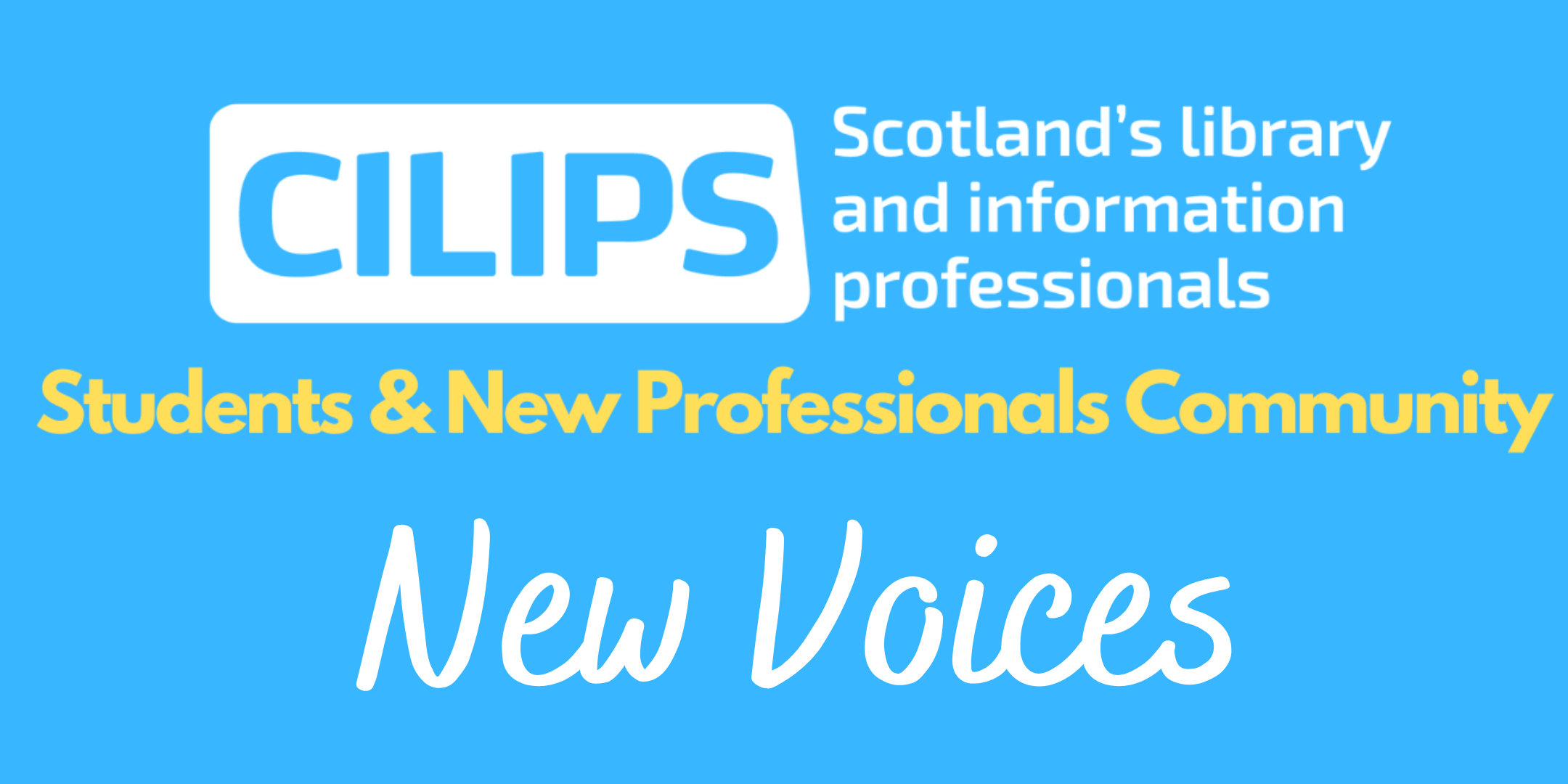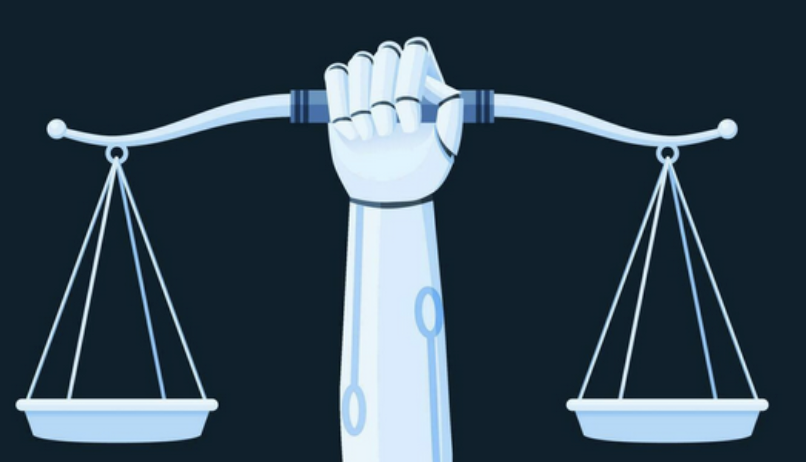New Voices RGU Student Series 2024- Jordan Kirton
Category: Blog, New Voices, New Voices, RGU Student Series 2024

In the 2024 Student Series for the New Voices blog, CILIPS Students & New Professionals Community will be sharing the views of Robert Gordon University students from the MSc in Information and Library Studies.
With special thanks to Dr Konstantina Martzoukou, Teaching Excellence Fellow and Associate Professor, for organising these thought-provoking contributions.
Jordan Kirton is studying an MSc in Information and Library Studies, whilst working for an NHS library. He’s worked as a Software Engineer, holds a degree in Psychology and likes to write Fiction in his spare time, for which he has won an honourable mention from Writers of The Future.
Fostering a Culture of Critical Thinking in the Time of Generative Artificial Intelligence
Making decisions
To make well informed choices, people need to be informationally literate (Macdonald, 2018). Citizens need to critically evaluate and judge information, before they use it on important aspects of their life, like personal finance, or health related matters (Ofcom, 2022). Most individuals gather information from the internet, as it is easily accessible (Firth et al, 2019). But only 23% of 16–74-year-olds verify information’s truthfulness, meaning, people make uniformed decisions on important aspects of their lives (Eurostat, 2021).
Information professionals need to improve levels of information literacy, as information is changing, due to emergent technologies, like Generative Artificial Intelligence tools (Gen AI).
What is Generative Artificial Intelligence?
Generative AIs are language models, “pre-trained with data…available on the public Web…”, which is then, “…fine tuned with human feedback to provide responses that are useful” (Ritala, Ruokonen and Ramaul, 2023). Using Gen AI tools, information from a: website, webpage, or article, can be summarised in something as short as a sentence (Madiega, 2023). Allowing people to consume large amounts of information in bite sized chunks.
How will Gen AI impact Everyday Citizen’s and Libraries?
Gen AI is a new tool which will become commonplace. It will free up everything from customer service lines, to automating a variety of jobs (Valance, 2023). It will also have major implications for libraries and information professionals. Gen AI is already being used to offer out of hours support for referencing and general questions (Lappalainen and Narayanan, 2023).
As Gen AI tools become popular, information professionals may find their role changing from helping people search for information, to helping people verify information. But before advocating for the use of Gen AI tools, it is important to consider all aspects of them.
The Good, the Bad and the Ugly
The Good
Marginalised populations can benefit from Gen AI (Madiega, 2023). For instance, Gen AI can: provide subtitles for people with hearing disabilities and text processing for those who have communication difficulties, highlighting, how Gen AI tools can make information more accessible, which could improve levels of information literacy for all citizens (Guo et al 2019).
The Bad
People may become over reliant on Gen AI tools, leading to poor critical thinking skills, causing a decline in information literacy. Miles (2008), investigated students’ overreliance on calculators when solving arithmetic problems. Students became frustrated when unable to use calculators and without calculator verification, they were unsure if their answer was correct (Miles, 2008). Overreliance on technology affects critical thinking skills, demonstrating the potential impact Gen AI may have on information literacy skills.
The Ugly
Gen AI tools like, Chat GPT, have been shown to be accurate, however, there is conflicting research which demonstrates Gen AI tools are: inaccurate, biased, and discriminatory (Johnson et al, 2023; Madiega, 2023; Northwestern, 2023). There are also fears that data collected when using Gen AI tools, is being used, distributed and is a potential security risk (Hu and Min, 2023).
Creating Critical Thinkers

Figure 2: AI and Ethics Law Regulation Artificial Intelligence Robot Hand Vector Illustration Concept Technology Moral and Legal Policy.
Information professionals can foster a culture of critical thinking through discussion. Discussion has been shown to develop critical thinking and it is a cost-effective solution to information professionals, and libraries, requiring people to either be online, or in person (EveryLibrary, no date; The University of Manchester Library, no date). Through discussion information professionals can turn negative aspects of Gen AI, into positive learning opportunities and develop everyday citizens’ information literacy skills.
Conclusion
Generative AI can be a useful tool, but it is the duty of information professionals to remind people, Gen AI is a tool and should not think for them. Information professionals should showcase facts about Gen AI tools, so individuals can make well informed decisions.
References:
AI and Ethics Law Regulation Artificial Intelligence Robot Hand Vector Illustration Concept Technology Moral and Legal Policy Pro Vector, no date, image vecteezy, viewed 20th October 2023, < https://www.vecteezy.com/vector-art/23831957-ai-and-ethics-law-regulation-artificial-intelligence-robot-hand-vector-illustration-concept-technology-moral-and-legal-policy>
Eurostat (2021) How many people verified online information in 2021? – Products Eurostat News -. Available at: https://ec.europa.eu/eurostat/web/products-eurostat-news/-/ddn-20211216-3 (Accessed: 7th October 2023).
Firth, J., Torous, J., Stubbs, B., Firth, J, A., Steiner, G, Z., Smith, L., Alvarez-Jimenez, M., Gleeson, J., Vancampfort, D., Armitage, C, J., Sarris, J., 2019. The “online brain”: how the Internet may be changing our cognition. World Psychiatry, Vol. 18(2), 119-129. doi: 10.1002/wps.20617.
Guo, A., Kamar, E., Wortman, J., Vaughan, W., Wallach, H., and Morris, R, M., 2019. Toward Fairness in AI for People with Disabilities: A Research Roadmap. Doi: https://doi.org/10.48550/arXiv.1907.02227
American Library Association (no date). Book Discussion Groups: Hosting and Facilitating Available at: https://libguides.ala.org/c.php?g=576217&p=9108742 (Accessed: 7 October 2023).
Hu, Y. and Min, H. (Kelly) (2023) ‘The dark side of artificial intelligence in service: The “watching-eye” effect and privacy concerns’, International Journal of Hospitality Management, 110, p. 103437. Available at: https://doi.org/10.1016/J.IJHM.2023.103437.
Johnson D., Goodman R, Patrinely J, Stone C, Zimmerman E, Donald R, Chang S, Berkowitz S, Finn A, Jahangir E, Scoville E, Reese T, Friedman D, Bastarache J, van der Heijden Y, Wright J, Carter N, Alexander M, Choe J, Chastain C, Zic J, Horst S, Turker I, Agarwal R, Osmundson E, Idrees K, Kiernan C, Padmanabhan C, Bailey C, Schlegel C, Chambless L, Gibson M, Osterman T, Wheless L. Assessing the Accuracy and Reliability of AI-Generated Medical Responses: An Evaluation of the Chat-GPT Model. Res Sq [Preprint].doi: 10.21203/rs.3.rs-2566942/v1.
Lappalainen, Y. and Narayanan, N. (2023) ‘Aisha: A Custom AI Library Chatbot Using the ChatGPT API’, Journal of Web librarianship 2023, 17(3), pp. 37–58. Available at: https://doi.org/10.1080/19322909.2023.2221477.
Lau, K., 2022. Generative AI Art Potential: The Future of Visual Marketing. [online] Linkedin. Available from: https://www.linkedin.com/pulse/ai-generative-image-potential-future-visual-marketing-karen-lau. [Accessed 30 September 2023]
EveryLibrary (no date). Libraries Foster Community Conversations. Available at: https://medium.com/everylibrary/libraries-foster-community-conversations-54a69a5d954a (Accessed: 7 October 2023).
Macdonald, G., 2018. What is information literacy? [online] CILIP. Available from: https://www.cilip.org.uk/news/421972/What-is-information-literacy.html [Accessed 25 September 2023].
Madiega, T., 2023. General-purpose artificial intelligence. [Online] European Parliamentary Research Service. Available from: https://www.europarl.europa.eu/RegData/etudes/ATAG/2023/745708/EPRS_ATA(2023)745708_EN.pdf [Accessed on 02/10/2023]
Miles, C. (2008) ‘The Use or Non-Use of Calculators Affects on Student’s Ability to The Use or Non-Use of Calculators Affects on Student’s Ability to Perform Basic Mathematics Problems Perform Basic Mathematics Problems’. Available at: https://digitalcommons.odu.edu/ots_masters_projects/89 (Accessed: 6 October 2023).
Northwestern University., 2023. Using AI Tools in your Research. [online] Available from: https://libguides.northwestern.edu/ai-tools-research
Ofcom. 2022. Online Nation. [Online]. Ofcom. Available from: https://www.ofcom.org.uk/__data/assets/pdf_file/0023/238361/online-nation-2022-report.pdf [Accessed 02/10/2023]
Ritala, P., Ruokonen, M. and Ramaul, L. (2023), “Transforming boundaries: how does ChatGPT change knowledge work?”, Journal of Business Strategy, Vol. ahead-of-print No. ahead-of-print. https://doi-org.ezproxy.rgu.ac.uk/10.1108/JBS-05-2023-0094
Sadeghi, M., and Arvanitis, L., 2023. Rise of the Newsbots: AI-Generated News Websites Proliferating Online. [Online] Newsguard. Available from: https://www.newsguardtech.com/special-reports/newsbots-ai-generated-news-websites-proliferating [Accessed 30 September 2023]
Schwarz, G., Christensen, T. and Zhu, X. (2022), Bounded Rationality, Satisficing, Artificial Intelligence, and Decision-Making in Public Organizations: The Contributions of Herbert Simon. Public Admin Rev, 82: 902-904. https://doi.org/10.1111/puar.13540
Valance, C. (2023) AI could replace equivalent of 300 million jobs – report – BBC News, BBC News. Available at: https://www.bbc.co.uk/news/technology-65102150 (Accessed: 7 October 2023).
The University of Manchester Library, (no date). Workshops (MLE). Available at: https://www.library.manchester.ac.uk/training/my-learning-essentials/workshops/ (Accessed: 7 October 2023).
Williams, G, A., and Brener, J., 2019. Three Robots, image, IMDB, viewed 20th October 2023, <https://www.imdb.com/title/tt9788484/mediaviewer/rm511533568/?ref_=tt_md_1>.
Yisong Yue, Rajan Patel, and Hein Roehrig. 2010. Beyond position bias: examining result attractiveness as a source of presentation bias in clickthrough data. In Proceedings of the 19th international conference on World wide web (WWW ’10). Association for Computing Machinery, New York, NY, USA, 1011–1018. https://doi.org/10.1145/1772690.1772793
